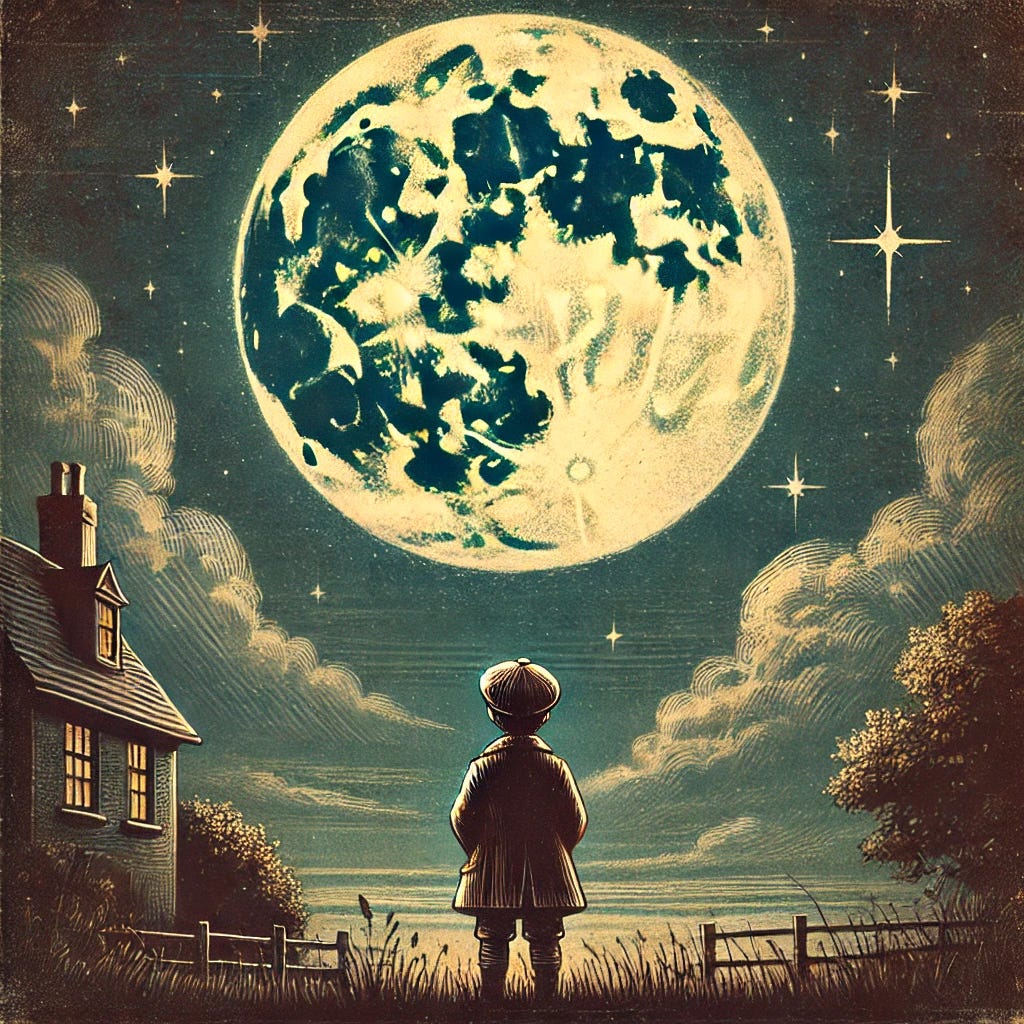The remarkable thing about wonder is that somewhere along the line, most of us lose it.
It's like a sock in the dryer of life, if you will. You know you had it when you put it in, but by the end of the cycle, it mysteriously vanished.
During a recent nighttime drive with the family, my two-and-a-half-year-old daughter was performing what I can only describe as an interpretive dance of joy over the moon. Yes, the moon—that same celestial body that's been hanging around our planet for roughly 4.5 billion years, inspiring countless poets, lovers, and NASA budget requests.
The thing about children and wonder is that they're remarkably good at it.
Terrifyingly good, actually.
They find fascination in absolutely everything which makes them delightful companions but occasionally maddening ones, especially when you're trying to get somewhere in a hurry and they've discovered an especially interesting piece of lint.
I was pondering this while being forced to listen to "I Will Go Sailing No More" from Toy Story for what was approximately the four hundredth time that day.
Scientists have actually looked into this phenomenon.
Frank C. Keil at Yale University discovered that children's love of science doesn't fade because they learn too much about it. Rather, they lose their sense of wonder itself, which is rather like saying you stop enjoying meals not because the food gets worse, but because you've misplaced your ability to taste. It's both profound and slightly worrying.
Americans have developed a particularly efficient system for extracting wonder from daily life.
They start early, mind you, with that peculiarly American question: "What do you want to be when you grow up?" Not "What makes you curious?" or "What fills you with delight?" but "What economic role do you plan to fill in our vast machinery of commerce?" It's rather like asking a butterfly what kind of spreadsheets it plans to produce.
The typical American office building is an architectural achievement of sorts, though not in the way anyone intended. It manages to be simultaneously enormous and cramped, modern and outdated, populated and lonely.
It's rather like someone designed a habitat for humans after reading about them in a book but never actually meeting one.
Europeans have taken a different approach entirely.
The very concept of stopping everything in the middle of the day to rest and reflect is so foreign to American culture that trying to explain it is like trying to explain synchronized swimming to a cat—theoretically possible, but likely to be met with blank stares and general confusion.
My fellow Italians, who lead Europe in hours dedicated to personal care and leisure, have elevated idleness into high art.
This philosophy can be distilled into "dolce far niente"—the sweetness of doing nothing.
It's not just a saying, but an entire cultural framework that's helped Italy maintain the EU's healthiest work-life balance, with only 3% of Italians working extended hours compared to the OECD average of 10%. Perhaps they’ve discovered what the rest of the world is slowly realizing: humanity's cosmic purpose might extend beyond inbox management.
The idea is that spontaneity and adventure can bring joy, pleasure, and meaning. It can also mean taking time to appreciate the sheer impossibility of existence while sipping espresso and watching the world go by, which is arguably a better use of time than any meeting I've ever attended.
We've managed to create a world where you can instantly access all human knowledge through a device in your pocket, and what do we use it for? Watching videos of cats being startled by cucumbers. Though, to be fair, those videos are pretty wonderful in their own way.
The real tragedy of modern life isn't that we've lost our sense of wonder—it's that we've organized our entire society around the premise that wonder is something you do on vacation, preferably while holding a camera and standing in front of something that has been officially designated as wonderful. It's rather like scheduling spontaneity, which is, of course, missing the point entirely.
Wonder, like those hardy microorganisms that survive in the most unlikely places, refuses to be completely eliminated.
It pops up in the most unexpected moments—like watching your child watch the moon through car windows on the highway.
The solutions are both simple and profound.
Spend more time doing nothing in particular, embrace uncertainty, and occasionally try to see the world as if you've just arrived here from somewhere else.
This last bit of advice is particularly useful, as it happens to be exactly what children do naturally.
They haven't been here long enough to become jaded about things like gravity, photosynthesis, or the fact that tiny packets of information are constantly flying through the air and somehow turning into cat videos on our phones.
As I watched my daughter's ongoing lunar love affair through the car window, it occurred to me that we've got it all backward. We spend our lives pointing at things and teaching children what they are, when perhaps we should be letting them teach us what things could be. After all, there's something rather wonderful about a universe that gives us both a moon to wonder at and the ability to wonder at it—even if it takes a two-year-old to remind us of that fact.
And perhaps that's the real secret: wonder isn't actually something we lose—it's something we forget we have.





Congrats on that final version, love this article !
This is very interesting and beautiful article at the same time.
And I just want to let you know that illustrations in your articles are marvelous.
Keep it up!